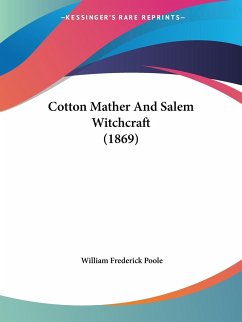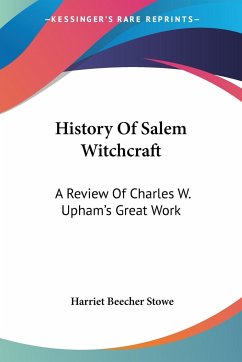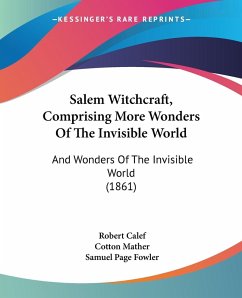
Witchcraft In Salem Village (1904)
Versandkostenfrei!
Versandfertig in 1-2 Wochen
19,99 €
inkl. MwSt.

PAYBACK Punkte
10 °P sammeln!
Witchcraft In Salem Village is a historical book written by John Fiske in 1904. The book provides a detailed account of the infamous Salem witch trials, which took place in 1692 in Salem Village, Massachusetts. Fiske examines the social, cultural, and political factors that contributed to the hysteria and mass hysteria that led to the persecution and execution of innocent people accused of witchcraft. Fiske's book also explores the role of religion in the Salem witch trials, as well as the impact of the trials on American history and culture. The author draws on primary sources, including cour...
Witchcraft In Salem Village is a historical book written by John Fiske in 1904. The book provides a detailed account of the infamous Salem witch trials, which took place in 1692 in Salem Village, Massachusetts. Fiske examines the social, cultural, and political factors that contributed to the hysteria and mass hysteria that led to the persecution and execution of innocent people accused of witchcraft. Fiske's book also explores the role of religion in the Salem witch trials, as well as the impact of the trials on American history and culture. The author draws on primary sources, including court records, diaries, and letters, to provide a comprehensive and objective analysis of the events that unfolded in Salem Village. Throughout the book, Fiske challenges popular misconceptions and myths about the Salem witch trials, and offers a nuanced and insightful interpretation of this dark chapter in American history. Witchcraft In Salem Village is an essential read for anyone interested in the history of witchcraft, the Salem witch trials, and the social and cultural dynamics of early America.This scarce antiquarian book is a facsimile reprint of the old original and may contain some imperfections such as library marks and notations. Because we believe this work is culturally important, we have made it available as part of our commitment for protecting, preserving, and promoting the world's literature in affordable, high quality, modern editions, that are true to their original work.












